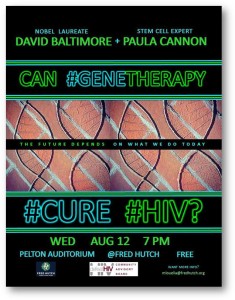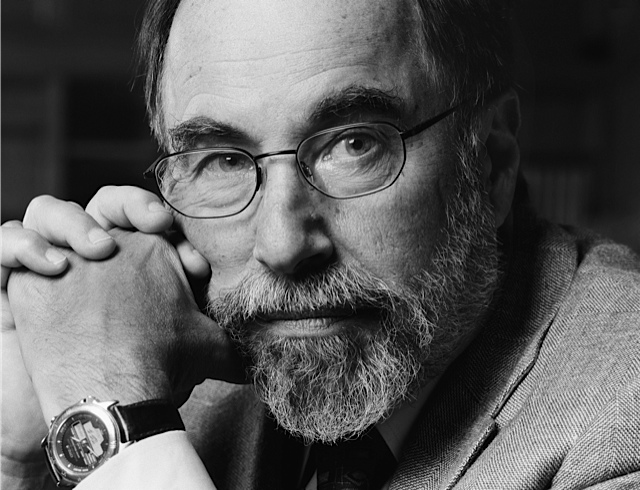CAN GENE THERAPY CURE HIV?
WED AUG 12 7PM
PELTON AUDITORIUM
@FRED HUTCH
Click Here for the Facebook Event Page
On Wednesday, August 12th at 7 PM, Nobel laureate David Baltimore will join stem cell expert Paula Cannon to tell us why they think gene therapy will be vital to curing and controlling HIV.
Get some answers about gene therapy and its potential to cure HIV and prevent its transmission during a moderated Q&A with two of the brilliant minds working to achieve the impossible.
This FREE community event will be held in Pelton Auditorium, which is located in the Thomas Building on the campus of Fred Hutch, Seattle, WA (1100 Fairview Ave N, Seattle, WA 98109).
In 1975 Dr. David Baltimore shared a Nobel Prize in Medicine for his discovery of the reverse transcriptase enzyme, which allows a retrovirus to convert its genetic information from RNA to DNA inside a healthy cell.
Because of this work, soon after its discovery we could find ways to treat HIV, and the first line of HIV therapy focused on this enzyme, reverse transcriptase.
In addition to his scientific work, Baltimore has leveraged major influence on our national policy concerning the HIV epidemic.
In 1986, he was invited by the National Academy of Sciences and the Institute of Medicine to coauthor an independent report: Confronting AIDS (1986), in which they called for a $1 billion research program for HIV.
To the credit of the U.S. federal government, by about three years later, they were spending $1 billion, he says.
Spending money on this scale helped uncover the nature of the virus, the nature of the very strange little proteins that HIV makes, and give us the lay of the land so we could figure out how to attack the virus.
We now talk of “An AIDS-free generation”, “Ending AIDS” and “Getting to Zero” because of the successful implementation of the knowledge & tools we’ve gained via HIV clinical research funded by US taxpayers.
…and in no small way we have David Baltimore to thank for his role in securing such research into HIV in those early painful years.
None of us today would be able to say “END AIDS” with a straight face if it wasn’t for Baltimore’s efforts.
Currently Dr. Baltimore’s team is exploring a new way of stimulating the immune system to fight infectious diseases, focusing on HIV.
The premise of this project is that for some infections, including HIV, the immune system’s natural responses are inherently inadequate, and the traditional approach of using vaccines to stimulate and boost these responses is likely to be ineffective.
As an alternative, Dr. Baltimore and his colleagues propose to "engineer immunity," that is, use genetic engineering methods to produce immune cells that will make specific antibodies to fight off infection.

Find out on Wednesday, August 12th why Baltimore thinks we will never have a vaccine and will need to resort to gene therapy to help protect millions of people.


Joining Baltimore will be a woman whose lab has been at the forefront of this field of science.
Her work has brought us the first clinical trial of genetically modified blood stem cells in human beings as well as science talks with saucy titles, such as "Giving HIV the [Zinc] Finger Using Targeted an HIV-Resistant Immune System"
Her name is Dr. Paula Cannon.
Dr. Cannon’s research is focused on gene therapy, hematopoietic stem cells, and HIV. Her expertise in the laboratory lies in gene editing and humanized mice.
She obtained both her B.Sc. in Microbiology and Ph.D. in Genetics at the University of Liverpool, then went on to do post-doctoral training at Harvard Medical School and Oxford University in the fields of HIV and gene therapy.
Using zinc finger nucleases (ZFNs) to genetically alter CD4 cells is proving safe and effective in treatment studies. Laboratory work conducted by Cannon suggests it might be possible to do the same thing with stem cells to rebuild entire immune systems resistant to HIV, thus curing the virus.
Cannon is part of a “Disease Team’ of researchers awarded by the California Institute for Regenerative Medicine (CIRM), who gave out more than $250 million to 14 multidisciplinary teams of researchers in California, the UK and Canada to develop stem cell-based therapies for 11 diseases.[raw]

Cannon’s Team seeks to treat HIV using a gene therapy approach to modify the patient’s blood-forming stem cells. When transplanted back, those cells will produce T cells that are resistant to HIV infection
Her Team completed studies demonstrating the safety of these modified blood stem cells, and obtained the required federal and local approvals to initiate the first-in-human testing of the CCR5-modified blood stem cell therapy.

The Phase I clinical trial, which is sponsored by City of Hope and funded by Sangamo BioSciences and CIRM, has started to enroll participants.
Since this is the first study of its kind involving modified blood stem cells, the FDA has set the bar for safety precautions very high. How did they convince the FDA that there was a reasonable expectation of safety in moving this technique into humans? That there would be no impact on stem cell function and no tumors developing from this treatment?
You can find out this and much more on Wednesday, August 12th at Fred Hutch.

Together, Baltimore and Cannon exemplify the scientific leadership chipping away at the mystery of HIV persistence and testing new ways to achieve through gene therapy either total elimination or a long-lived remission in the greatest number of people with HIV.
And on Wednesday, August 12th at 7 PM will be your chance to ask questions to and learn from two people that POZ magazine named in their list of the top 100 people who are “accelerating the end of AIDS.”

Pelton Auditorium is located in the Thomas building of Fred Hutch Campus (1100 Fairview Ave N, Seattle, WA 98109), visitor parking is located outside the entrance.




